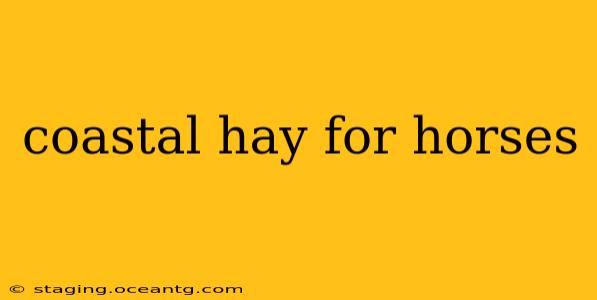Coastal hay, a type of bermudagrass hay, is increasingly popular among horse owners. Its nutritional profile and palatability make it a strong contender in the equine feed market, but understanding its pros and cons is crucial for ensuring your horse's health and well-being. This comprehensive guide will delve into everything you need to know about coastal hay for horses.
What is Coastal Hay?
Coastal bermudagrass is a warm-season perennial grass known for its high yield and excellent forage quality. Compared to other bermudagrass varieties, coastal hay generally boasts higher protein and digestible fiber content, making it a nutritious option for horses. However, the specific nutritional composition can vary significantly depending on factors like growing conditions, soil fertility, and the time of harvest.
Is Coastal Hay Good for Horses?
The answer to this question is a qualified "yes." Coastal hay can be excellent for horses, particularly those requiring a higher protein diet, such as growing youngsters, pregnant mares, or those recovering from illness or injury. Its higher digestibility also means more readily available energy for the horse. However, it's crucial to remember that no single type of hay is universally ideal. The suitability of coastal hay depends on your horse's individual needs and metabolic profile.
What are the Benefits of Coastal Hay for Horses?
- High Palatability: Horses generally find coastal hay palatable, leading to increased feed intake and better overall nutrition.
- Higher Protein Content: Compared to some other hay types, it provides a good source of protein, vital for muscle development and repair.
- Good Digestibility: Horses efficiently digest coastal hay, maximizing energy absorption.
- Good Source of Fiber: Fiber is crucial for healthy digestion and gut function in horses.
What are the Drawbacks of Coastal Hay for Horses?
- Potential for High Sugar and Starch: Depending on the growing conditions and harvesting time, coastal hay can be higher in non-structural carbohydrates (NSCs) including sugars and starch. This is a significant concern for horses prone to laminitis or insulin resistance. Regular testing of your specific hay batch is crucial.
- Variation in Nutritional Content: The nutrient composition of coastal hay can vary greatly, making consistent feeding challenging.
- Cost: Coastal hay can sometimes be more expensive than other hay types.
How to Choose and Manage Coastal Hay for Horses
Selecting high-quality coastal hay is paramount. Look for hay that is:
- Green in color: Indicates proper curing and minimal nutrient loss.
- Free of mold and dust: Essential for preventing respiratory problems.
- Soft and pliable: Suggests proper curing and palatability.
- Properly tested: Knowing the NSC content is vital, especially for at-risk horses. A reputable hay testing lab can provide this information.
Proper storage is equally important. Store hay in a dry, well-ventilated area to prevent spoilage and mold growth.
How Much Coastal Hay Should My Horse Eat?
The amount of coastal hay your horse needs will vary based on factors such as its age, weight, activity level, and overall health. Consult with your veterinarian or equine nutritionist to determine the appropriate feeding amount for your horse. They can help you create a balanced feeding plan that considers the nutritional profile of your coastal hay.
Can Coastal Hay Cause Laminitis?
While coastal hay itself doesn't directly cause laminitis, its high NSC content in some cases can contribute to the development of this serious condition. Regular monitoring of your horse's weight, hooves, and overall health, coupled with careful hay selection and feeding management, is essential to mitigate this risk.
What is the Difference Between Coastal and Bahia Hay for Horses?
Both coastal and Bahia hay are warm-season grasses, but they have some key differences. Coastal hay generally offers higher protein and digestibility, but can be higher in NSCs. Bahia hay is often lower in protein and digestibility but typically lower in NSCs. The best choice will depend on your horse's individual needs.
Is Coastal Hay Better Than Bermuda Hay for Horses?
There's no single "better" hay. The nutritional profiles of coastal and other Bermuda grasses vary considerably based on factors like variety, growing conditions, and harvesting techniques. A thorough nutritional analysis of the specific hay you're considering is the most reliable way to make an informed decision.
By carefully considering the nutritional profile of coastal hay and managing its feeding responsibly, you can harness its benefits while mitigating potential risks. Remember to always consult with your veterinarian or equine nutritionist for personalized advice on your horse's dietary needs.
